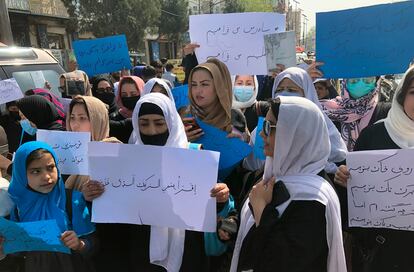U.N.: Ban on Afghan female staffers by Taliban unacceptable
The statement Wednesday comes a day after the U.N. said it had been informed by Afghanistan’s ruling Taliban that Afghan women would no longer be allowed to work for the world body

The U.N. said Wednesday it cannot accept a Taliban decision to bar Afghan female staffers from working at the agency, calling it an “unparalleled” violation of women’s rights.
The statement came a day after the U.N. said it had been informed by Afghanistan’s ruling Taliban that Afghan women would no longer be allowed to work for the world body. That announcement came after the U.N. mission in the country expressed concern that its female staffers were prevented from reporting to work in eastern Nangarhar province.
The Taliban decision is “an unparalleled violation of women’s rights, a flagrant breach of humanitarian principles, and a breach of international rules,” Wednesday’s statement said. The Taliban have not commented publicly on the ban.
The U.N. statement said several U.N. national female personnel have already experienced restrictions on their movements, including harassment, intimidation and detention.
“The UN has therefore instructed all national staff – men and women – not to report to the office until further notice,” the statement said.
Despite initial promises of a more moderate rule than during its previous stint in power in the 1990s, the Taliban have imposed harsh measures since taking over the country in 2021 as U.S. and NATO forces were pulling out of Afghanistan after two decades of war.
Girls are banned from education beyond sixth grade. Women are barred from working, studying, traveling without a male companion, and even going to parks. Women must also cover themselves from head to toe.
Prior to Tuesday, Afghan women were already barred from working at national and international non-governmental organizations, disrupting the delivery of humanitarian aid. But the ban did not cover working for the U.N.
That changed this week. On Wednesday, the U.N. mission said that under the Taliban order, no Afghan woman is permitted to work for the U.N. in Afghanistan, and that “this measure will be actively enforced.”
The ban is unlawful under international law and cannot be accepted by the United Nations, the statement said.
The secretary-general’s special representative for Afghanistan, Roza Otunbayeva, was engaging Taliban authorities to convey the U.N.’s protest and to seek an immediate reversal of the order. The U.N. said it is also engaging member states, the donor community and humanitarian partners.
“In the history of the United Nations, no other regime has ever tried to ban women from working for the Organization just because they are women,” said Otunbayeva. “This decision represents an assault against women, the fundamental principles of the U.N., and on international law.”
Ramiz Alakbarov, the U.N. deputy special representative for Afghanistan, said at a news conference in New York that both male and female Afghan national staff have been asked to stay home until they can return to work under “normal conditions.”
“We will not have a situation where we are only working with all-male teams,” he said.
The U.N. has about 3,900 staff in Afghanistan, including approximately 3,300 Afghans and 600 international personnel. The total also includes 600 Afghan women and 200 women from other countries.
Alakbarov said this means all 3,300 U.N. national staff will stay home until the women can return to work, and they will be paid.
He said the ban doesn’t apply to international female staff and they are able to move freely and provide aid. But he said they are only about 30% or less of the total U.N. Afghanistan staff.
Alakbarov said the new U.N. policy in the country will be revised depending on what sort of exemptions or operational environment can be negotiated. However, he said there is no scenario in which the U.N. would provide aid in the country with men only.
“It is not possible to reach women without women and without women, they will not be reached. And that’s the unfortunate reality,” he said.
Alakbarov said U.N. officials led by Otunbayeva met Tuesday with the Taliban’s foreign minister and they were told “there will be no additional order because the order was already issued in December,” apparently a reference to the Taliban decision that month to bar women from working for NGOs.
Taliban restrictions in Afghanistan have drawn fierce international condemnation. But the Taliban have shown no signs of backing down, claiming the bans are temporary suspensions in place allegedly because women were not wearing the Islamic headscarf, or hijab, correctly and because gender segregation rules were not being followed.
Sign up for our weekly newsletter to get more English-language news coverage from EL PAÍS USA Edition
Tu suscripción se está usando en otro dispositivo
¿Quieres añadir otro usuario a tu suscripción?
Si continúas leyendo en este dispositivo, no se podrá leer en el otro.
FlechaTu suscripción se está usando en otro dispositivo y solo puedes acceder a EL PAÍS desde un dispositivo a la vez.
Si quieres compartir tu cuenta, cambia tu suscripción a la modalidad Premium, así podrás añadir otro usuario. Cada uno accederá con su propia cuenta de email, lo que os permitirá personalizar vuestra experiencia en EL PAÍS.
¿Tienes una suscripción de empresa? Accede aquí para contratar más cuentas.
En el caso de no saber quién está usando tu cuenta, te recomendamos cambiar tu contraseña aquí.
Si decides continuar compartiendo tu cuenta, este mensaje se mostrará en tu dispositivo y en el de la otra persona que está usando tu cuenta de forma indefinida, afectando a tu experiencia de lectura. Puedes consultar aquí los términos y condiciones de la suscripción digital.








































